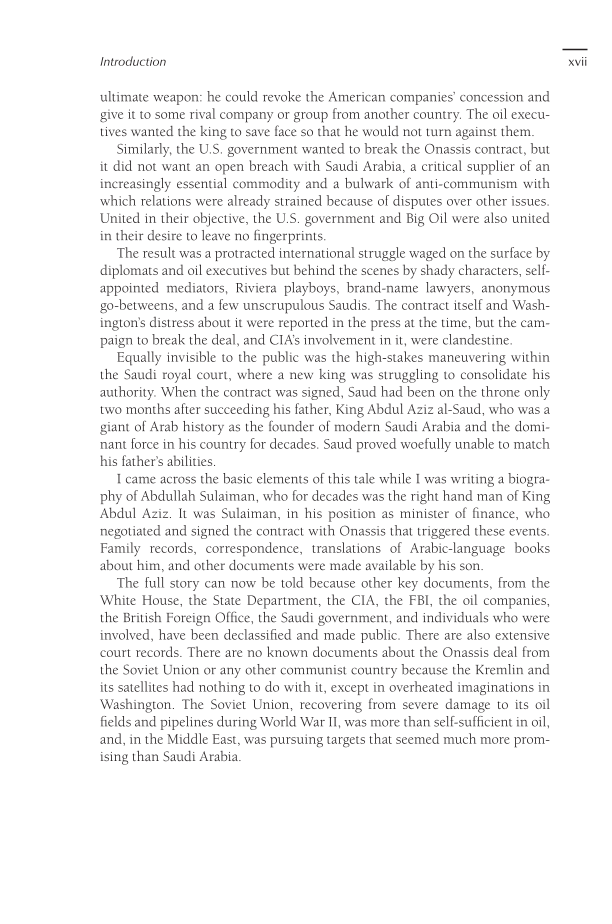Introduction xvii ultimate weapon: he could revoke the American companies’ concession and give it to some rival company or group from another country. The oil execu- tives wanted the king to save face so that he would not turn against them. Similarly, the U.S. government wanted to break the Onassis contract, but it did not want an open breach with Saudi Arabia, a critical supplier of an increasingly essential commodity and a bulwark of anti-communism with which relations were already strained because of disputes over other issues. United in their objective, the U.S. government and Big Oil were also united in their desire to leave no fingerprints. The result was a protracted international struggle waged on the surface by diplomats and oil executives but behind the scenes by shady characters, self- appointed mediators, Riviera playboys, brand-name lawyers, anonymous go-betweens, and a few unscrupulous Saudis. The contract itself and Wash- ington’s distress about it were reported in the press at the time, but the cam- paign to break the deal, and CIA’s involvement in it, were clandestine. Equally invisible to the public was the high-stakes maneuvering within the Saudi royal court, where a new king was struggling to consolidate his authority. When the contract was signed, Saud had been on the throne only two months after succeeding his father, King Abdul Aziz al-Saud, who was a giant of Arab history as the founder of modern Saudi Arabia and the domi- nant force in his country for decades. Saud proved woefully unable to match his father’s abilities. I came across the basic elements of this tale while I was writing a biogra- phy of Abdullah Sulaiman, who for decades was the right hand man of King Abdul Aziz. It was Sulaiman, in his position as minister of finance, who negotiated and signed the contract with Onassis that triggered these events. Family records, correspondence, translations of Arabic-language books about him, and other documents were made available by his son. The full story can now be told because other key documents, from the White House, the State Department, the CIA, the FBI, the oil companies, the British Foreign Office, the Saudi government, and individuals who were involved, have been declassified and made public. There are also extensive court records. There are no known documents about the Onassis deal from the Soviet Union or any other communist country because the Kremlin and its satellites had nothing to do with it, except in overheated imaginations in Washington. The Soviet Union, recovering from severe damage to its oil fields and pipelines during World War II, was more than self-sufficient in oil, and, in the Middle East, was pursuing targets that seemed much more prom- ising than Saudi Arabia.
Document Details My Account Print multiple pages
Print
You have printed 0 times in the last 24 hours.
Your print count will reset on at .
You may print 0 more time(s) before then.
You may print a maximum of 0 pages at a time.






























































































































































































































































































